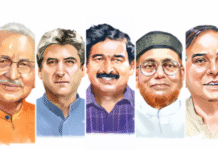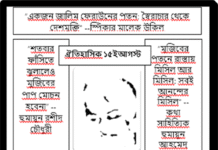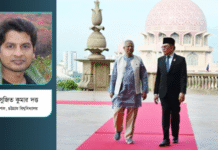The people have been rendered helpless, or else they would have been able to say, we do not want a government that doesn’t have the ability to provide us with rice, yet asserts itself as the all-powerful master
The picture splashed across the Daily Star on Friday was saddening. It was of a sari-clad woman pedaling a rickshaw down the street. In the passenger seat sat a man with a huge pile of vegetables. He was a vendor taking his ware to Mirpur 1.
Only a couple of days ago this woman was a housemaid. She lost her work when the government declared the lockdown. During the lockdown, most employers don’t permit their maids, drivers or hawkers to enter their homes. Having no alternative, this 45-year-old woman turned to rickshaw-pulling to earn a living. Perhaps she is the only earning member of her family.
The day before that I saw on a private TV channel, a good-looking young man, in trousers and shirt, also pedaling a rickshaw, defying the lockdown. The police accosted him and he was pleading with them not to seize his rickshaw otherwise he would not be able to survive. The youth was a university student. He would work as a tutor, teaching to earn a living and bear the expenses of his studies. His tuitions had halted because of coronavirus and he too had no choice but to take up rickshaw-pulling.
There is no account of how many such men and women over the past year have had to switch their means of livelihood. There is no account either of how many people had lost their means of income. Those who are supposed to keep an account of such matters, have turned deaf and dumb. We ask the government — what significance does the golden jubilee of independence hold for this woman who plies a rickshaw to earn a living? What difference does it make to this university student who is pedaling a rickshaw, whether the country is a developing one or has been upgraded to a middle income one? He knows, if he can’t provide tuition, he has to ply a rickshaw. The state will do nothing for him. The bigwigs of the society will not come forward either.
The government claims great success in tackling coronavirus. Is this what success is all about? While the government is basking in the rhetoric of its success, we see there are no vacant beds in hospital, no ICU, no oxygen cylinders. There are not enough sample testing centres. People are rushing with their patients from one hospital to the other.
Amidst all of this, startling news appeared on 12 April in Prothom Alo. The Directorate General of Health Services (DGHS) had taken a decision to appoint 1,800 technicians. The candidates took their written and oral exams, but the questions papers of the written exam had allegedly been leaked out in advance to the examinees in exchange of Tk 1.5 million (Tk 15 lakh) to Tk 2 million (Tk 20 lakh).
The city has ministers, mayors, leaders, bureaucrats, councilors and activists willing to give their lives for the party. But there is no one to look out for these people who have a hand-to-mouth existence.
The examiners noted that those who had scored almost full marks in the written exams, performed miserably in the orals. In fact, those who didn’t fare so well in the written exams, did much better in the oral test. This made two of the examiners suspicious and they brought the matter to the attention of the authorities. But the matter didn’t end there. When one of the officials involved in the underhand transactions learnt that the matter had come out into the open, he offered one of the examiners a bribe of Tk 10 million (Tk 1 crore), with promises of more.
Nero was fiddling while Rome burned. While Bangladesh is devastated by the spread of coronavirus, a certain section of officials in the health department are busy with their bribery and corruption. The public is already aware of the Shahed-Sabrina scams. The health sector is rife with corruption and irregularities.
When the 14 April lockdown was announced, or the lax lockdown before that from 5 April, thousands of people rushed homewards to the villages. Have the senior government officials tried to determine the reason behind this mass exodus? If they did, they would see that the people are rushing home because of the uncertainty they face in livelihood. They know lockdown means the rickshaw-pullers can’t take to the streets with their rickshaws, day labourers won’t get work, construction workers will have to sit idle at home. People won’t allow domestic help into their homes.
The zamindar tradition of landlords as introduced by the British has long been abolished, but the tradition lingers on among the urban ‘gentlemen’. In many apartment buildings in Dhanmondi, Gulshan, Banani and other such residential areas, a notice is often seen with the words, ‘Domestic help and drivers are not allowed to use the lift.’ It is as if the ‘gentlemen’ and their families will be defiled if they share the lift with domestic help and drivers.
Before every lockdown, poor people surge in hordes to the villages. Even if there are no trains or launches, they walk, go by rickshaw or rickshaw vans, easybikes, or even trucks, notwithstanding the risks involved in the hazardous overcrowded commute. They know that they will not manage to survive in the city. The city has ministers, mayors, leaders, bureaucrats, councilors and activists willing to give their lives for the party. But there is no one to look out for these people who have a hand-to-mouth existence.
For whom is this state, actually for whom this government?
The government imposed a nationwide lockdown from 5 April and on 8 April the finance ministry submitted a proposal to the prime minister’s office, proposing to provide 3.5 million (35 lakh) families with Tk 2,500 each before Eid. Why couldn’t they have taken this decision before 5 April? Last year the government had taken a decision to provide 5 million (50 lakh) families with Tk 2,500 each, but not everyone received this. Only 3.6 million (36 lakh) families received the money. Many well-to-do families had been included on the last, but were later dropped when the matter came to light. What guarantee is there this time that the assistance will reach these 3.5 million (35 lakh) families?
There is a basic question here. Can the government spare only Tk 5000 in two years for each of these poor families who toil day and night to keep the wheels of the state and society running? The government has said that the money will be paid before Eid. How will they survive before that? The lockdown is being extended. What will they do if they cannot work in the homes of the city folk, if they can’t take their rickshaws to the streets, if they can’t vend their ware in the streets?
The state and society has rendered them so powerless that they are unable to bargain or negotiate. If they could, they would have firmly demanded that food be delivered to their homes before the lockdown. That they be given alternative means of employment if they lose their jobs. They would have been able to say, we do not want a government that doesn’t have the ability to provide us with rice, yet asserts itself as the all-powerful master.
* Sohrab Hassan is joint editor of Prothom Alo and a poet. He can be contacted at sohrabhassan55@gmail.com.
* This column appeared in the print and online edition of Prothom Alo and has been rewritten for the English edition by Ayesha Kabir









